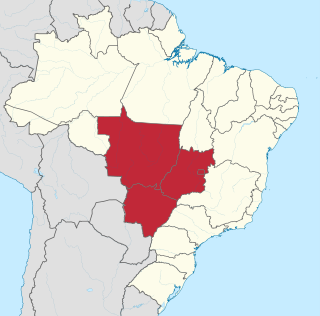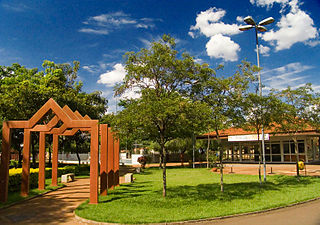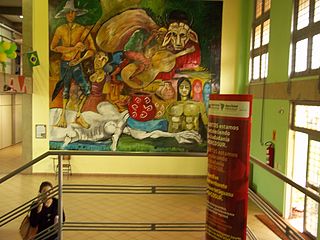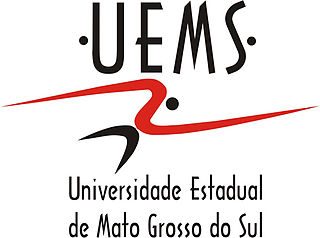
Mato Grosso do Sul is one of Brazil's 27 federal units, located in the southern part of the Central-West Region, bordering five Brazilian states: Mato Grosso, Goiás and Minas Gerais (northeast), São Paulo (east) and Paraná (southeast); and two South America countries: Paraguay and Bolivia (west). It is divided into 79 municipalities and covers an area of 357,145.532 square kilometers, which is about the same size as Germany. With a population of 2,839,188 inhabitants in 2021, Mato Grosso do Sul is the 21st most populous state in Brazil.

Campo Grande is the capital and largest city of the Brazilian state of Mato Grosso do Sul in the Center-West region of the country. The city is nicknamed Cidade Morena because of the reddish-brown colour of the region's soil. It has a population of 906,092, according to a 2020 IBGE estimate.

The Central-West or Center-West Region of Brazil is composed of the states of Goiás, Mato Grosso and Mato Grosso do Sul; along with Distrito Federal, where Brazil's national capital, Brasília, is situated. The region comprises 18.86% of the national territory.

Corumbá is a municipality in the Brazilian state of Mato Grosso do Sul, 425 km northwest of Campo Grande, the state's capital. It has a population of approximately 112,000 inhabitants, and its economy is based mainly on agriculture, animal husbandry, mineral extraction, and tourism, being the gateway to the biggest wetlands of the world, the Pantanal. Due to its border with Bolivia, Bolivians in Brazil constitute a significant portion of the city's population, forming a distinct cultural community.

Operário Futebol Clube, commonly referred to as Operário de Campo Grande, Operário-MS or simply Operário is a Brazilian professional club based in Campo Grande, Mato Grosso do Sul founded on 21 August 1938. It competes in the Campeonato Sul-Mato-Grossense, the top flight of the Mato Grosso do Sul state football league.

Morenão, also known as Estádio Universitário Pedro Pedrossian, is the home ground of Operário and Esporte Clube Comercial. It is located at Cidade Universitária, in Campo Grande, Mato Grosso do Sul, Brazil.

Dourados is a Brazilian municipality, situated in the state of Mato Grosso do Sul, 225 km (140 mi) Southwest of Campo Grande. It has a population of about 225,000 inhabitants, and its economy is based mainly in arable agriculture and in cattle ranching. Dourados is also the second most populous and important city of this state.

Ponta Porã is a municipality located in the Brazilian state of Mato Grosso do Sul. Its population is 93,937 (2020) and its area is 5,329 km2. It has a dry border and a conurbation with the city of Pedro Juan Caballero in Paraguay.
The Western Military Command is one of eight Military Commands of the Brazilian Army. The Western Military Command or "Comando Militar do Oeste" (CMO) is responsible for the defence of the states Mato Grosso and Mato Grosso do Sul.

The Dom Bosco Catholic University is a private, non-profit Catholic university, located in Campo Grande, the capital of the State of Mato Grosso do Sul, in western Brazil. It is maintained by the Catholic Archdiocese of Campo Grande.

José Manuel Fontanillas Fragelli was a Brazilian politician, lawyer and academic. Fragelli served as the governor of Mato Grosso from 1970 until 1974 and the President of the Senate of Brazil from 1985 through 1987.

The Federal University of Grande Dourados is a Brazilian public institution which is located in the city of Dourados, state of Mato Grosso do Sul, Brazil.

Palmeiras-Barra Funda Intermodal Terminal is the second largest intermodal transportation hub in São Paulo, Brazil. The terminal has access to the São Paulo Metro, CPTM commuter rail, and numerous bus lines.

The Mato Grosso do Sul State University is a public university in the state of Mato Grosso do Sul, Brazil. It has 15 campuses all over the state, and its rectory is located in the city of Dourados.

Federal Institute of Education, Science and Technology is a Brazilian institution of higher education with a number of campi around Brazil. Comprising Brazil's Federal Network of Vocational, Scientific and Technological Education, it offers students a wide range of curricula, including both general education and specialized vocational and professional training in science, technology, and pedagogy.

The 2022 Mato Grosso do Sul state election took place in the state of Mato Grosso do Sul, Brazil between 2 October 2022 and 30 October 2022. Voters elected a governor, vice governor, a senator, 8 representatives for the Chamber of Deputies of Brazil and 24 Legislative Assembly members. The incumbent governor at the time, Reinaldo Azambuja, wasn't allowed to run for reelection for a third consecutive time due to term limits established by the Federal Constitution of Brazil.

Miss Mato Grosso do Sul is a Brazilian Beauty pageant which selects the representative for the State of Mato Grosso do Sul at the Miss Brazil contest. The pageant was created in 1979 and has been held every year since with the exception of 1990-1991, 1993, and 2020. The pageant is held annually with representation of several municipalities. Since 2023, the State director of Miss Mato Grosso do Sul is, Frank Rossatte.
Eduardo Rocha is a Brazilian politician who serves as Secretary of the Civil House of Mato Grosso do Sul, in the government of Eduardo Riedel, as well as a state deputy for Mato Grosso do Sul since 2011, he is married to Simone Tebet, a minister in the Government Lula da Silva.
















